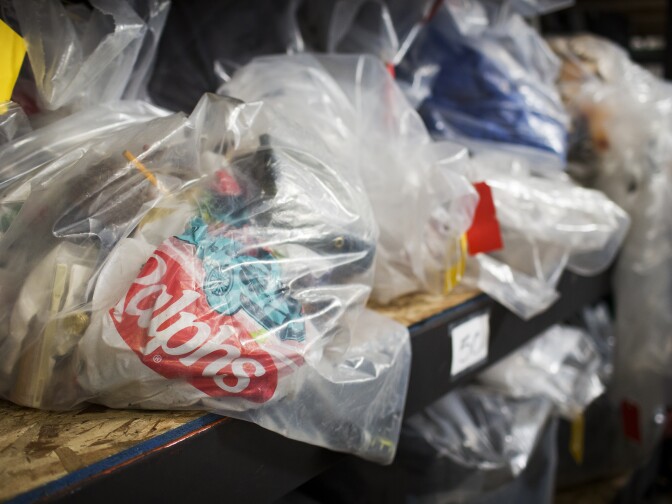This story is free to read because readers choose to support LAist. If you find value in independent local reporting, make a donation to power our newsroom today.
This archival content was originally written for and published on KPCC.org. Keep in mind that links and images may no longer work — and references may be outdated.
Lack of storage makes homeless camp clean-up laws toothless
The Los Angeles City Council last week gave final approval to new ordinances designed to address the tent encampments proliferating through the city in recent years by clearing away their belongings.
Mayor Eric Garcetti told reporters this week he'll block enforcement until the council passes amendments clarifying what can be seized and what - if any - criminal penalties homeless might face.
But the bigger problem with enforcing the ordinance is that the city doesn't have anywhere to store the homeless's personal items, as the law requires.
"This ordinance isn't going to do anything," said Councilman Gil Cedillo, who cast the lone dissenting vote against the measure.
Councilman Jose Huizar, who backed the measure, didn't respond to a request for comment.
A spokesman for the L.A. City Attorney's Office said in an email the law "does not depend on the availability of storage." He said enforcement "is up to the City Council and Mayor."
The ordinances were designed to make it easier for the city to clear encampments - a practice that has spurred lawsuits in the past and left the city operating under a series of settlement agreements.
Workers clearing the sidewalks used to have to give the homeless three days to find somewhere to store their stuff. Under the new policies, city workers must only give notice 24 hours before clearing tents and makeshift shelters from sidewalks. They still have to store personal items for 90 days, so they can be claimed.
"There are ongoing cleanups happening now, there is a process to do cleanups of encampments at this time," said Peter Lynn, director of L.A.'s Homeless Services Authority. "When you're talking about enforcement of this new ordinance, it's not clear exactly how that will proceed."
The storage facility the city uses for belongings cleared during cleanups is already full. The 30,000-foot warehouse - called The Bin - is just off Skid Row in Downtown Los Angeles and costs the city $816,000 a year.
"It's about 95 percent full," said Alex Conedy, The Bin's manager. "And it stays pretty full."
Anyone looking to claim their property must give a description, along with the area in the city where it was seized and the date it was taken. About five people per month retrieve their property, whereas the vast majority of it is eventually thrown away.
A cleanup in the Arroyo Seco last week brought in 32 bags worth of items, which were stored behind a locked fence.
"Having your property taken miles away - and then being told you can go retrieve it, even though of course, you have no vehicle to put it in - that doesn't really solve the problem," said Gary Blasi, a law professor at UCLA and homeless advocate.
The City Council's Ad Hoc Committee on Homelessness has asked the city administrator to look into the possibility of finding more storage space, scattered throughout the city.
Blasi said they're missing the point.
"It's not that we should be trying to preserve people's tents, blankets and sleeping bags, it's that we should be helping them get into ordinary housing," he said.
Seized property only takes up a small part of The Bin. Most of the warehouse is used by homeless voluntarily storing belongings. On a visit last week, bikes and house plants sat neatly in one corner, while bags filled with everything from clothes to tennis rackets, to a can of Rogaine filled the shelves.
Conedy, The Bin's manager, said some people come every day for a change of clothes before heading to work, while others merely visit weekly to get what they need and renew their claim on their bin.
Employees of Chrysalis, the homeless services non-profit that manages the space, expertly picked out numbered bins from a sea of 1,500 colored receptacles and wheeled them to their owners. Men and women, meanwhile, waited behind a line for their bin to arrive, before digging through their belongings for what they needed.
Jeanetta Haywood said she and her husband, Anthony, visit their bin filled with clothes, paperwork, and kids toys (for their son) a few times a week.
"Our stuff is basically secure, safe, nobody's messing with it," she said.














